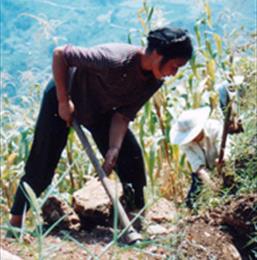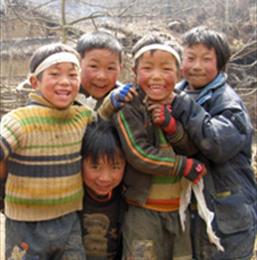Aug/Sep 2006
30th September 2006
Wanlin Village Baseline Study Report
To choose the second integrated project village supported by Mr. Xiong Darun, DORS staff went to Wanlin village for the second time in August 2006 and carried out a baseline study. With the use of participatory working methods, like visits to township and village leaders, convening village meetings and small group meetings, semi-structure interviews with rural households, map-making and site exploration, we came to understand the situation of the infrastructure, forestry, agriculture and livestock etc of this village.
This village consists of in total 6 groups, 93 households and 344 people, from which 37 households with in total 153 people are of Yi Nationality which accounts for 44% of the population. The rest of the population is Han Nationality. Work on infrastructure in this village is mainly done on road construction, electricity and water supply, from which the main existing problems are: if the road surface is not good and even enough, the villagers will be unable to send their agricultural products out in the rainy season; Furthermore, the present water supply system suffers from: road repairs that press the water pipes to break, water pipes getting older, problems with the quality of the water pipes, frost problems etc. This results in serious leakage to the water pipes and insufficient water supply, which causes enormous inconvenience to the villagers' lives.
The current economic situation of this village is possibly better than in Shiquan village. We cannot spend a lot of time and funds on infrastructure, so we can do more income generation projects. The villagers in this village are quite open-minded: they dare to do what they think. They also have developed many income generation projects such as the production of liquor, planting the Sichuan prickly bush, livestock development, honeybee cultivation, planting the oil cedar tree and the pomegranate and self-production of methane gas. Some of these projects were very successful. There are some problems in this village: apart from the Han population in which there are some possible latent problems between the Yi and Han Chinese, there are various other aspects that all fairly conform to the requirements of our organisation and to those of Mr. Xiong for choosing a village. Now we first need to further gather and understand more information and then determine again whether to implement integrated projects in this village.
Mr. Xiong Darun's First Village: Shiquan
Shiquan Village Water Supply Project
At the end of last year we already completed the baseline study for the water supply project in Shiquan village, but because there were a lot of arrangements to make for this project, the implementation for the water supply project is set after this year's harvest period. In August a survey was carried out for the water supply project in Shiquan village, which included the size of the water source and water volume, the distance from water source to basin, the distance from water source to the different households and the different water levels of the water source. Furthermore, engineer Peng Gong from the Water Conservancy Bureau was invited to carry out the technical supervision of the engineering of the water supply project.
School Repairs in Shiquan Village
School repairs were one of Shiquan village's integrated projects, and it was also one of the problems the villagers wanted to solve most. The students, guardians and the villagers of Shiquan village all thought that because the school was in a bad condition it was not a good learning environment and that it to a certain extent influenced the quality of education. The school had the following structural problems: a water leakage in the roof, window frames were falling out, insufficient light, a moist floor, a water drainage facility behind the classroom was lacking/needed, a tattered classroom door, tattered toilets and so on. We repeatedly discussed with the villagers which plan was more suitable: repair the school or build a new one. At the same time the Bureau of Education also visited the village and finally decided to repair the school. In April DORS signed a contract with the villagers for 6,915 RMB for the repairs. The villagers have worked hard and the maintenance work on the school has already been completed. Now the students can sit and study inside a safe, reliable, spacious, bright, and warm school.
Integrated Development Projects
School for Sanshihu
The school for Sanshihu has already been completed, and has been built completely according to the terms of the contract; the quality of the school is very good. The leader of the Bureau of Education, and the Pingba township government went to Sanshihu to carry out the approval of this school, and wrote the approval report. The Bureau of Education has already sent an official teacher to teach in this village, and has provided desks and stools for this village school. Now 30 children of around 6 years old already started going to this school, and they don't have to walk more than 1 hour on a muddy path along a ravine anymore to go to the central school. Seeing the children go to a school so close to home makes the villagers particularly happy.
Livestock Projects in Shishier Village
Because livestock projects are very risky, we repeatedly consulted the villagers in Shishier village to see whether they were determined to implement this project, and to see how to implement it. Because the disease rate of sheep in these villages is quite high, we got into contact with the Animal Husbandry Bureau to use their technological resources to reduce the risk of disease as much as possible. To reduce the risk in this project, we and the villagers have also conducted an implementation plan and a feeding system in which the responsibilities of the feeding households are made clear. After this implementation plan and this feeding system will have been discussed repeatedly with the village leader and the villagers, a final decision will be made. To guarantee every household that they have the opportunity to participate in this project, each participating household will be able to fulfill duties and responsibilities to feed their livestock. There are certain terms set up for the participating households, and they can only participate in this project when they live up to these terms; for instance managing a technological standard, reaching a certain scale of growing grass for fodder and so on. In this particular sector we will off course take the views of the social vulnerable groups into account to suit their methods. The project can only be implemented when the villagers have finished the preparations and when they have passed the strict inspections.
Gansu Baishuijiang Natural Conservation Region's visit to DORS
The staff of Gansu Baishui Jiang Natural Conservation Region and Lanzhou University's Professor Wei Huilan visited our organisation on the 19th and 20th of September to learn from our organisation's experience on energy projects in rural villages. We introduced them to our many years of successful experience in the operating process for fuel efficient stoves in rural villages. We also arranged for them to visit one of our fuel efficient stoves projects, implemented in the integrated project village Ma Ping; they personally inspected the fuel efficient stove project, and also acquainted themselves with some local villagers. They were very interested in the sustainable development of the fuel efficient stove project in which DORS provides technical training for the local villagers to master the construction of the fuel efficient stoves. We also continued exchanging technical knowledge about fuel efficient stoves with them.
DORS News and Information
At the end of August 2006, DORS Vice-Director Guo Yumei participated in a course of the second session of the Social Policy International Forum series, organized by five institutes including the Social Development and Public Policy Research Institute of Beijing Normal University, the Public Management Institute of Qinghua University and so on. The subject of this forum was concentrated on the question of the focus of social policy in China. National and international well-known experts gave presentations on results from research on the domain of social policy in China, and high officials from related government departments gave presentations about the latest trends on social policy in China. The second day was divided into 6 forums with presentations and discussions about the reform of health care organisation, the problem of elderly people and old-age insurance, rural reform and poverty alleviation and so on. Guo Yumei from DORS gave a presentation at the rural reform and poverty alleviation forum, introducing DORS, its working methods and the over many years obtained achievements.
In mid-September DORS Vice-Director Guo Yumei and staff Wang Zhifang participated in a four day administration and financial training in Chengdu organized by Misereor. The training helped us come to a more detailed understanding and control of specific requests from which many are related to Misereor administrative and financial management aspects, and has built a solid foundation for further cooperation with Misereor.
Many thanks go out to the Misereor foundation for always having supported our organisation for so many years. Also many thanks go out to the director of the training Wolf Kantelhardt for his patient explanations.
Anne-Marie Verdel from the Netherlands joined DORS at the end of September to further consolidate DORS' manpower.
DORS wishes everyone a happy National Day and a happy Mid-autumn Festival for the entire family


